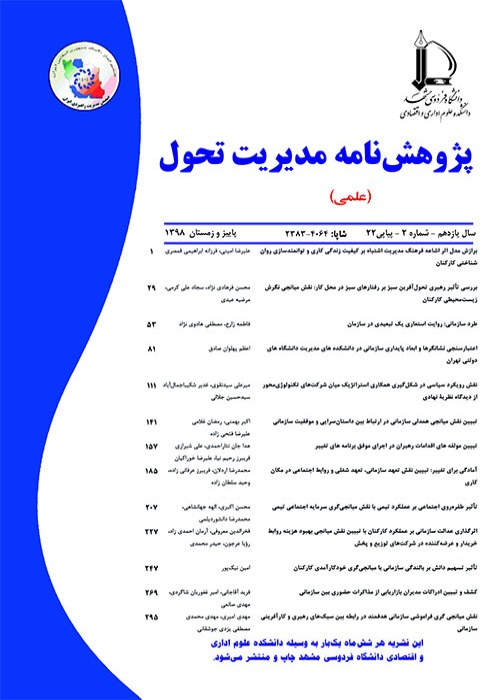Relationship between bully leadership and hypocritical behavior: the role of perceived climate of silence and interpersonal trust
Author(s):
Abstract:
INTRODUCTION
In a particular kind of organizational behavior, a member of the organization at least two interpersonal communication situations with other stakeholders in the organization issues different and sometimes contradictory behaviors on a single attitudinal issue, only one or none of them is consistent with his (her) actual attitude. Such a form of organizational behavior is known by the name of hypocrisy in interpersonal communication. Trust have the most effect on interpersonal behavior, because it influences the efficiency and accuracy of communications. If trust is affected by factors such as leadership style and Perceived climate of silence and reduced, the ground for happening hypocritical behavior will be provided. One of the style of leadership that can confuse interpersonal trust and create organizational silence is the style of Bully leadership. This study examine the effect of bully leadership style on hypocritical behavior. The mediating role of interpersonal trust between bully leadership and hypocritical behavior and the moderator role of perceived climate of silence on the relationship between interpersonal trust and hypocritical behavior were also investigated.
THEORETICAL FRAMWORK
One of the most harmful leadership species is bully leadership, a leader who apply psychological or physical abuse of power against someone who is in a weaker position. The bully leader is heavily angry, bad-tempered and jealous of others; hence he decomposes and destroys the others. Hypocrisy is a kind of lie in which a person pretends to have a particular attitude to be holy or justified to others. Hypocritical behavior is a behavior in which a person, without changing his attitude, displays a heterogeneous behavior for a particular attitude. Hypocritical behavior has many implications, such as the darkness of trust in interpersonal relationships and the reduction of group performance, and affects the long-term organizational stability and relief of organization members. Trust is defined as a mutual treaty with others to achieve the goal and conduct behavior. Trust is a positive expectation from the other side, in which the individual is confident that the other party does not act opportunistically through words, actions or decisions and can be relied upon on him in various situations. Interpersonal communication will become mistrust if the behaviors of honesty, immorality and ignorance of values, accuracy, truth and stability of behavior are revealed. The climate of silence is the dominant atmosphere of organization in which members of the organization prefer not to manifest disadvantages and problems of the organization. Because they believe that it is not worthwhile to say and its consequences in the future come back to themselves. The climate of silence will lead to the organizational silence. In this case, interpersonal trust will also be destroyed. A leader who applies the style of leadership based on distrust to employees, actually provokes distrust, and the less trust between members of an organization is, the more the range of hypocritical behaviors in interpersonal communication is increased.
METHODOLOGY
Population of the study consist of the staff of one of the military organizations of Qazvin province which 81 people are selected based on Cochran’s formula and convenience sampling method. Questionnaires are used to collect the required data. The collected data were analyzed Using confirmatory factor analysis, Structural equation modeling and Smart PLS software.
RESULTS & DISCUSSION
Data analysis consists of two parts: a) descriptive statistics (demographic characteristics of the statistical sample) and b) inferential statistics (testing research hypotheses). In the inferential statistics section, fitting the model was confirmed and the model was evaluated in two modes of estimating the standard coefficients and significant magnitudes and given that all the research hypotheses had a value of t greater than 1.96, all assumptions were confirmed.
CONCLUSIONS & SUGGESTIONS
Based on the results of the research, it was found that the bully leadership has a positive and significant effect on the hypocritical behavior, which suggests that leaders avoid the occurrence of Machiavellian behaviors and practices that provide flattery. It has also been shown that bully leadership has a negative and significant impact on interpersonal trust, and thus it is suggested organizational leaders will focus on the negative consequences of bullying on interpersonal trust and lead their leadership style towards positive leadership styles, such as ethical Leadership. The results indicated that interpersonal trust has a negative and significant effect on the hypocritical behavior. Accordingly, organizational leaders should be bound to the principle of honesty in order to build trust among employees; providing opportunities for exchange of views and values in the organization; and respecting for justice among employees.Keywords:
Language:
Persian
Published:
Transformation Managemet Journal, Volume:10 Issue: 2, 2019
Pages:
149 to 178
magiran.com/p1973087
دانلود و مطالعه متن این مقاله با یکی از روشهای زیر امکان پذیر است:
اشتراک شخصی
با عضویت و پرداخت آنلاین حق اشتراک یکساله به مبلغ 1,390,000ريال میتوانید 70 عنوان مطلب دانلود کنید!
اشتراک سازمانی
به کتابخانه دانشگاه یا محل کار خود پیشنهاد کنید تا اشتراک سازمانی این پایگاه را برای دسترسی نامحدود همه کاربران به متن مطالب تهیه نمایند!
توجه!
- حق عضویت دریافتی صرف حمایت از نشریات عضو و نگهداری، تکمیل و توسعه مگیران میشود.
- پرداخت حق اشتراک و دانلود مقالات اجازه بازنشر آن در سایر رسانههای چاپی و دیجیتال را به کاربر نمیدهد.
In order to view content subscription is required
Personal subscription
Subscribe magiran.com for 70 € euros via PayPal and download 70 articles during a year.
Organization subscription
Please contact us to subscribe your university or library for unlimited access!


